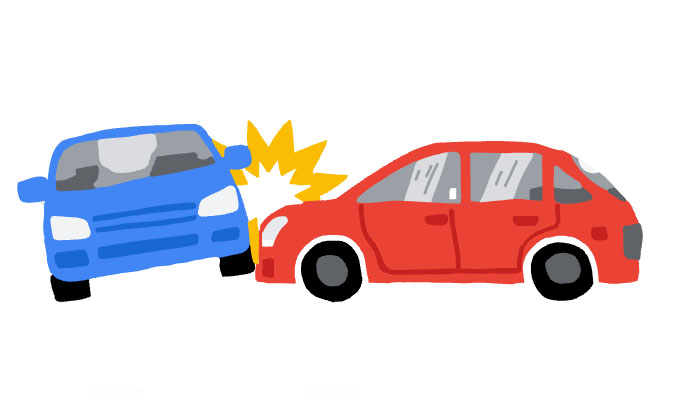Mia Guidolin
It seems like many students, and even teachers, at West have gotten in car wrecks lately. And as the weather gets colder, the roads can get even more dangerous.
Senior Madalyn Gaskin got into a wreck this past June on 291 Highway. “There was this green Jeep truck, a white SUV in front of me, and then there was me.”
Gaskin said that the green truck was making a turn and slammed on it’s brakes, causing the white car and Gaskin to do the same. “We went from 60 to zero real quick. I didn’t have time to react so I rear-ended him [white car]… it completely totaled my car.”
Before getting in the crash, Gaskin said she already had precautions in the back of her mind. “My mom was in a bad accident, she was put into a coma when she was my age.” That crash didn’t prove fatal for Gaskin’s mother, but it did for her best friend. “I kinda had that in the back of my head, but I was also just like- oh it’ll be fine,” Gaskin said.
Gaskin said that she would always wear her seatbelt, but sometimes not correctly. “I would have the top half behind my back.”
Gaskin thinks that the problem is when people have the mindset of ‘it won’t happen to me’. “You think it’s not going to happen to you, but it could. And even if you’re not the problem, there’s a ton of—sorry—stupid people on the road.”
Gaskin said that her perspective on driving hasn’t changed, but she is a lot more cautious about taking her own advice. “I make sure that everyone in the car is okay, I wear my seatbelt properly now, I make sure to have all distractions put away.” Gaskin said that she usually would have her phone propped up, but she doesn’t do that anymore.
Thinking back on her accident, Gaskin recalls that she was in the car with her friend, which she said was an added “distraction,” and that she had been looking down at the title of the song that was playing.
Now when she’s driving, Gaskin makes sure to not get too close to the car in front of her. “I actually didn’t know this before, but there’s a rule: If the speed limit is 60, then you have to be six feet away from the car in front of you.”
A very popular, and useful rule to follow when driving is the three second rule. Many drivers have heard of it, but in case you haven’t, the rule states that when the car in front of you passes a marker on the road (this could be a fire hydrant, street sign, etc), you should be able to count three seconds before passing that object.
Gaskin said that part of her mistake was her lack of education on the rules of the road. “I read the permit book once, got a hundred on the test, and then didn’t look at it again… you just completely forget about it.”
Being on the road, there are many things that you need to look out for. People speeding, not using turning signals, and people who last-minute decide to switch into your lane are all things that can cause unwanted accidents.
“People can be reckless. They swerve into lanes and get distracted on their phones- that’s also a bad thing, just stay off your phone,” Gaskin said, “That text can wait because… a lot can happen in a split second.”
Gaskin not only had to deal with the immediate consequences of her accident, but also the long term effects. She admitted that she now has a lot of anxiety when driving.
“Even though I was the driver in the accident, I still feel better when I’m the one driving because I have more control,” Gaskin said.
Even when she’s in the passenger seat, Gaskin said that she can break down. “It’s getting better, but it’s still that feeling of: oh that car’s right there, I don’t want them to be too close. I just start overthinking and then I start panicking.”
Gaskin said that she doesn’t think the feeling will ever go away. “My mom is almost 50 and she is still terrified… that will live with you for a while. Especially if your best friend passes away.” When she was 18, Gaskin’s mother got in an accident when she was 18. The crash caused her to end up in a 2 week coma, and caused the driver to pass away.
Junior Readan Ballard also got in a car wreck recently. “I was driving down I-35, I had my brother and his friend in the car. Someone rear-ended someone, and someone rear-ended them, and then my brakes crapped out and I hit all of them. The airbags went off, things went down, and the car was totaled,” she said.
Ballard said that before the accident, her thoughts on driving safely weren’t really at the top of her mind. “I just went through the motions like everyone else… you put on your seatbelt but you don’t really consider why.”
Whenever her seat belt tightens, Ballard says she gets a little nervous. “Same with the airbags, I get really nervous with them now,” she said.
Ballard’s advice to other drivers is to “watch the cars around you. Crashes can also be the people around you, and if you’re looking out you can avoid them.”
Ballard said she doesn’t want to accuse anyone of being on their phones, but being conscious of your phone being a distraction, and being careful is also something to think about.
Like Gaskin, Ballard now is careful to not get close to other cars. “I’ll go purposefully slow just to keep a long distance.”
Junior Ciara Lewis got in a minor accident in October, right in the West parking lot. Lewis had to drive her mom’s car to school that day, due to her car having a popped tire. “I parked farther out in the parking lot, in the new area by the football field. My mom’s car was bigger so I wasn’t used to parking it, but I still parked perfectly fine, and in between the lines.”
When Lewis went out to her car at the end of the day, her friend (who she drives home) noticed a note on the windshield. Initially, Lewis was scared that it was something else. “My mom had always warned me about sex trafficking, so I immediately got in the car and locked it before reading it.”
It turns out that another student at West had been pulling out of their parking spot and had put a “huge dent” on the car’s back bumper. “He left a note with all of his info so I could contact him, which was good because I didn’t even notice the dent beforehand—I would’ve been in so much trouble with my parents,” Lewis said.
According to the AAA Foundation, around 682,000 hit-and-runs happen a year in the United States, so Lewis would be considered lucky that the person responsible took accountability. “Thankfully everything worked out and my mom’s car is getting fixed in January,” Lewis said.
Lewis said that her parents had drilled driving safety into her and her brother’s heads before they started driving. “I know accidents happen, but for the most part they can be avoided if you’re just simply paying attention to your surroundings,” she said, “but, also adding that, most of the things can wait until you’re parked. Your texts, Snapchats, calls, etc, they can all wait.”
While she’s driving, Lewis said she pays special attention to the cars that are swerving. “I try to slow down or get out of their way. Either they are drinking and driving, or just getting distracted and that could put both of us in danger.”
Lewis thinks that phones are a major cause of car accidents. “Everyone is addicted to their phone, even me. There’s no shame in it, but just that one second of looking at your phone can be one second that could make your life turn upside down,” Lewis said.
There will always be bad drivers, we can all do our part in keeping the road safe. Like Gaskin said, “You can’t control other people’s actions, you can only do what you can.”















